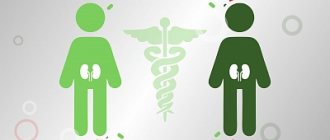If the kidneys begin to fail, how long do they have to live? Not only the patients themselves, but also their relatives, who are constantly nearby, begin to think about this. As doctors note, everything will depend on timely treatment and the neglect of the disease. That is, the sooner a person seeks medical help, the greater the opportunity to save him from inevitable death.
This means that kidney failure is no laughing matter. You must always be on guard with her. Because without normal kidney function, the body will not be able to independently get rid of unnecessary substances that poison it. These include processed compounds that leave the body through the genitourinary system.
This happens if the kidneys work smoothly without interruption, because they are the main filters. In pathologies in which the cleansing process is disrupted, the threat of death increases due to intoxication. When, as a treatment, a doctor may suggest that a patient undergo hemodialysis, which involves artificially cleansing the body of toxins.
Manifestation of the acute stage
As a rule, the chronic and acute forms of the disease differ from each other. The latter is characterized by a violation of renal blood flow and nitrogenous compounds in the body during renal failure. When a patient, due to kidney disease, begins to suffer from rare urination, he develops oliguria.
Symptoms of acute renal failure:
- Blood cells are observed in the urine.
- Itchy feeling on the skin.
- Pain in the abdomen and back.
- Salts in urine.
- Increased blood pressure levels.
- Feeling of weakness and fatigue in the body.
- Signs of nausea with vomiting.
- Swelling on the face, arms and legs.
Such symptoms in the acute form of the disease develop quite quickly. At first, the patient will show signs of disturbances in urinary processes until they cease completely. In this case, the patient develops anuria, against the background of which the person’s kidneys may fail.
When, along with the symptoms of urinary retention in the body, the patient’s lungs also fill with fluid, it becomes difficult for him to breathe, and he experiences swelling throughout the body. This often happens if a person has a uremic coma.
Symptoms of chronic renal failure
Sometimes they make themselves felt not immediately, but only after some time. Since the symptoms may not be noticeable at first due to the replacement of diseased organ tissue with healthy tissue. Only after, when most of the kidneys are affected, the patient experiences renal failure.
When the remaining healthy side cannot cope with urinary processes, the patient experiences difficulties with urination as a result. He often goes to the toilet at night, and the amount of urine that comes out of his body decreases sharply.
Where, together with such symptoms, the patient may experience the following problems:
- Bleeding from the gums.
- Swelling of the arms and legs.
- Lack of appetite.
- Malfunctions of the gastrointestinal tract.
- Bone and chest pain.
- Bad odor from the mouth.
- Pale areas of skin with noticeable yellowness and grayness in the area of edema.
If, with such symptoms, the patient does not immediately seek medical help, hoping to cope with the disease on his own by taking only painkillers. He thereby runs the risk of developing renal nephritis or pyelonephritis, depending on the course of the disease.
Further, if the patient also does not intend to go to the hospital and continues to be treated on his own, then subsequently, against the background of a chronic illness, he begins to be bothered by headaches and high blood pressure. In this case, men may lose not only their sex drive, but also their potency.
In general, during an illness, the patient’s immunity sharply decreases, when the illness can be aggravated by the development of tremors and a decrease in mental functions. Including the formation of sores, bruises and skin rashes. In the worst case, the patient may have a stroke or heart attack, which subsequently risks death.
Causes
What role do the kidneys play in our body? They cleanse the body of toxins and harmful substances by removing them through the organs of the urinary system. If they fail, then, as a rule, the filtration process is disrupted. Toxic compounds begin to accumulate in the blood, and urea stagnation occurs.
For this reason, the body gradually begins to suffocate. Poisoning occurs when the chance of survival without medical care remains practically zero.
As doctors note, kidney failure in a person can begin for the following three reasons:
- Prerenal. It is explained by poor blood circulation in the kidneys, which develops against the background of diseases such as atherosclerosis, thrombosis or diabetes mellitus.
- Renal. It often develops due to damage to the kidney tissue due to unforeseen use of potent drugs. Including the penetration of toxic substances into the body, chronic diseases of internal organs.
- Postrenal. It is characterized by obstruction of urine through the urinary tract due to urolithiasis, the growth of polyps or adenoma in men.
In some cases, the kidneys fail if a person has recently experienced a severe skin burn. Which led to the accumulation of potassium in the kidney tissues against the background of a pathological decrease in water in the body. When the symptoms of kidney disease can be observed in chronic or acute form.
Mechanism of renal failure
Kidney failure occurs most often in adults. However, chronic or acute course of the disease also occurs in children. In the case of children, the cause of this condition is anomalies in the structure of the organ. Both kidneys can fail at once.
The pathology develops according to the following scenario:
- The blood stops being filtered.
- Metabolic end products accumulate in the blood, poisoning the body.
- Due to intoxication, the functioning of internal organs is disrupted.
- There is a failure in the water-electrolyte balance.
- Acute cardiac and respiratory failure appears, and the nervous system fails.
- Renal coma ensues, and soon death.
These events develop literally in 6-8 hours. It is important to seek medical help in time to begin blood cleansing measures.
Complications of kidney failure
It is impossible to say how long a person can live with kidney failure in this case without medical intervention; it all depends on the complications the patient has and treatment methods. For example, if a person has kidney failure, in addition to this, symptoms of necrosis of renal tissue, pulmonary edema or pyelonephritis will be observed.
Often the cause of this is chronic manifestations of the disease. In this case, serious damage is caused to the functions of the central nervous system; under such circumstances, the patient may experience involuntary symptoms of tremors, convulsions, and even a decrease in mental abilities. Including a sharp decrease in immunity, which increases the risk of spreading the infectious process and other diseases.
In particular, in case of kidney failure, a patient may also experience signs of anemia characterized by a change in the synthesis of erythropoietin. Including severe symptoms of hypertension affecting the incidence of stroke or myocardial infarction. This has a negative impact on the skeletal system, which is why frequent cracks in the bones begin to be observed even after a minor blow or bruise.
We can say that a person literally begins to dry out before our eyes, quickly losing weight. Until he showed signs of anorexia and frequent bleeding in the organs of the digestive system. The patient's sex drive also decreases, including fertile days in women.
Features of treatment
Usually, those people who lived with kidney failure did not delay treatment, but always tried to promptly seek medical help when the disease manifested itself, and were more fortunate. This means that the first stage is always easier to treat than the subsequent ones; they cause complications and, accordingly, require more thorough diagnosis and complex treatment.
Considering this, in the acute stage of kidney failure, the patient may require an urgent blood transfusion procedure, including taking medications aimed at reducing symptoms and concomitant diseases. This necessarily includes anti-inflammatory drugs and traditional medicine. Medicines for heart and high blood pressure.
This allows you to delay the complete death of the affected organ, which also requires the procedure of dialysis or hemodialysis of the kidneys. The latter involves attaching a special tube to the human body, through which the process of cleansing the blood of toxins is subsequently carried out. Thereby preventing further poisoning of the body and subsequent death of a person.
Where, in addition, the patient is prescribed a diet consisting of lean dishes and a minimum content of protein foods. In the latter case, the doctor can give a referral to receive a donor kidney. It is necessary in case of removal of the affected organ for a healthy one.
However, not everything is so simple: doctors first need to find a donor with an identical Rh factor and blood group in accordance with the patient’s body. After the transplant, it is also important to wait for the body to get used to the transplant so that tissue rejection of the operated organ does not occur.
How is kidney failure treated?
How long a person will live in case of kidney failure depends on the correct therapy. It is selected by the doctor in accordance with the severity of the pathology and the general condition of the patient. First, you need to undergo an examination to make an accurate diagnosis: donate urine, blood, do an ultrasound, CT, MRI.
If the disease has become chronic, treatment will take a long time. If renal failure is detected at an early stage, it is possible to completely get rid of the pathology. The following medications are prescribed:
- diuretics - Furosemide, Uregit, Hypothiazide;
- penicillin antibiotics and cephalosporins (Cefazolin, Ceftriaxone);
- uroseptics - Urolesan, Canephron, Fitolysin;
- sorbents - Filtrum-STI, Enterodes, Enterosgel.
They also treat complications (diseases of the cardiovascular system, high blood pressure, cerebrovascular accidents). If acute liver failure is observed, the person is hospitalized in intensive care.
To prevent complete kidney death, dialysis is prescribed. During hemodialysis, the blood is purified outside the body; during peritoneal dialysis, a sorbing solution is injected into the abdominal cavity, which is then drained. This stops the intoxication of the body, and the person continues to live.
If the disease is life-threatening, a kidney transplant is prescribed. Doctors reserve this method as a last resort, when the organ completely ceases to cope with its functions.
At any stage of organ failure, it is important to follow a diet, exclude flour, salty, spicy, fried foods. Introduce more fruits and vegetables and fiber into the menu.
Life forecast
If the kidneys have already begun to fail, it is difficult to answer the question of how long a person can live. It all depends on timely medical assistance and properly selected treatment. In the worst case, by missing these points, kidney pathology can negatively affect the functioning of the cardiovascular system. For example, provoke a heart attack, stroke or diabetes.
When a person’s death occurs not only as a result of the above, but also as a result of other equally serious diseases. Although, according to doctors, a person can live longer than the expected prognosis for kidney failure. The main thing is to undergo artificial blood cleansing of toxins on time and take the necessary medications.
After all, it is hemodialysis that allows you to live for another 20–23 years in case of kidney failure, without which sick people live for only 2–3 days, after which they die from intoxication. Of course, there is no specific data, this is just an average value. This procedure is necessary for the rest of your life. The only help in this case is organ transplantation.
There are some difficulties, the operation is expensive and you have to wait several years for it, because finding a donor organ can be difficult. It is impossible to help a patient using only conservative methods.
After transplant
They say that a kidney transplant is a very expensive and complex operation. My mother is on the waiting list.
Veronica, Vologda
Article on the topic
First symptoms. What triggers kidney disease - On the contrary, it is the cheapest method of renal replacement therapy. For the first year after a kidney transplant, a person takes high doses of immunosuppressants - drugs that artificially suppress the immune system, so that there is no rejection of the transplanted organ. But in Russia there is a federal program “Seven Nosologies”, thanks to which all the necessary immunosuppressants are provided to the patient free of charge. Regardless of whether he is disabled, he is not disabled. And some people do not apply for disability after a transplant so as not to lose their jobs.
The “Seven Nosologies” program can be criticized, it can be said that it provides generics and not original drugs, but I can say that there are no outright bad drugs there. The patient does not have to worry about being left without treatment or having to pay for it himself.
A year after transplantation, the patient experiences a completely different quality of life - not like on hemodialysis. I have one patient, although I scolded him for it, he rafted down the Amazon after a kidney transplant. And the next year I went through the Jordan Desert. Many remain active, and you might not even realize that some of the famous people you see on TV are living with donor kidneys. They are no different from us, only they take pills regularly.
Chief nephrologist of the capital: “There is no shortage of dialysis beds in Moscow”
More details









